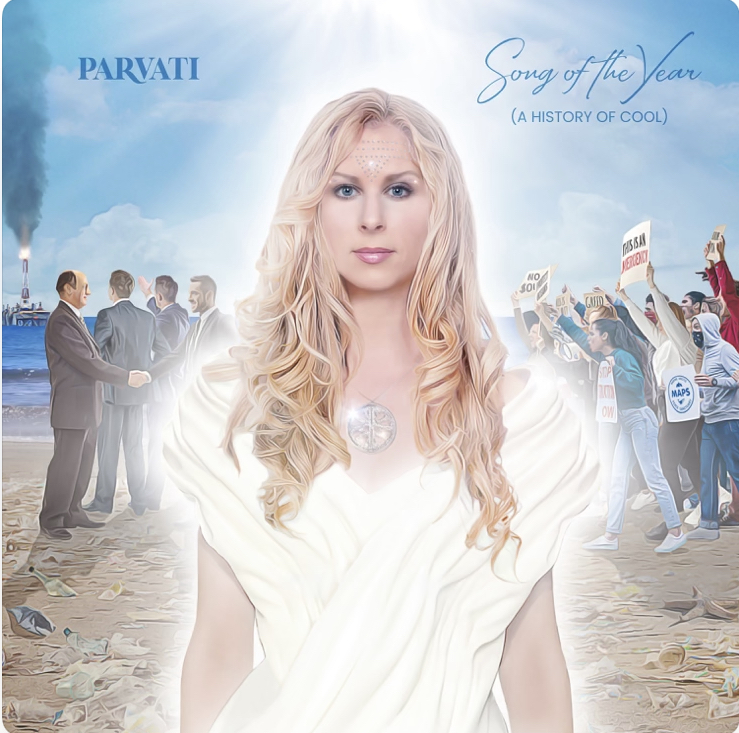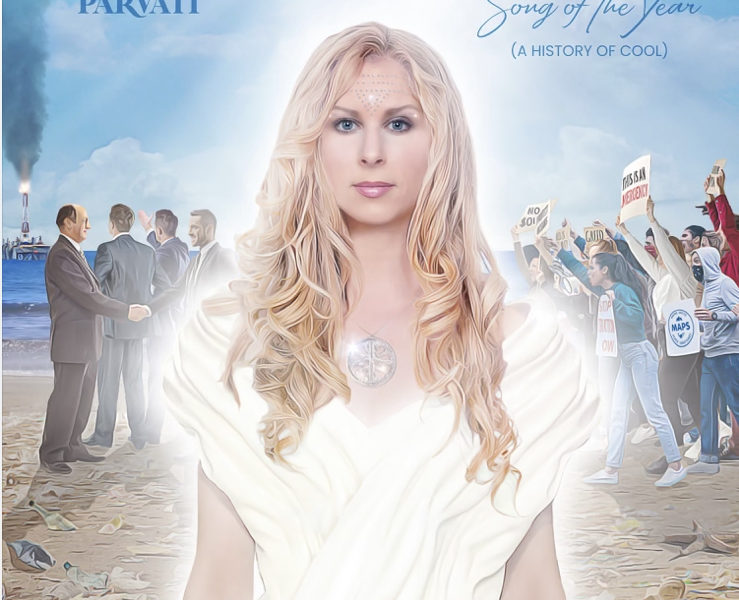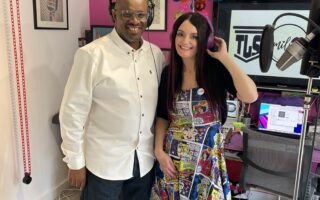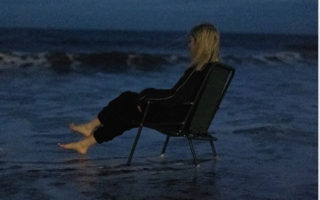Hello Pārvati how are you?
I am happy to be in touch with you—thank you for the opportunity—and am grateful for the gift of being alive on this beautiful planet!
Congratulations on the release of “Song of The Year” (A History of Cool)”. How does it feel?
I feel great about the track. I made it with a lot of love. I am delighted that people are enjoying it, it is getting radio pick up, and it supports a healthy world.
What’s the story behind it?
A few years ago, I decided to use my voice as a singer and touring musician and travel to the North Pole to raise awareness of the melting polar ice and its critical effect on the world. Deeply changed and moved by that trip, I returned to create the all-volunteer international charity Parvati Foundation to protect the entire Arctic Ocean. Most people don’t know that this body of water, the smallest ocean of our world, is responsible for stabilizing our global weather patterns that give us all the food and resources we need to survive. But it is critically endangered as business and governments seek to profit off of its thawing ice. Our first order of business at Parvati Foundation is to realize MAPS, the Marine Arctic Peace Sanctuary – the largest protected area in history – for the wellbeing of all life on Earth.
I created “Song of the Year: A History of Cool”, dedicated to MAPS, as an offering for our overheated world. It took time to compose the layers of music and craft the words. When I write and compose, I become very quiet and ask Nature, “What kind of song would you like this to be?” Then I listen as best I can. The process is a bit like taking dictation. When I sat down to write a song about protecting our climate, though it is a serious topic – the most important one we now face globally – I knew I wanted it to be both sober and full of hope and possibility. It needed to activate the change we must make to protect our future and address something very serious but not be preachy or a downer. There was a lot to say, and the song had to be succinct to appeal to pop radio. For me, it is a deep privilege to serve the world through MAPS, and a super joy to compose music.
Describe your sound in three words.
Heartfelt celestial pop.
You are a singer-songwriter and so much more from Montreal, Canada. How did it all begin for you?
From as early as I can remember, I have always felt the most connected and alive when I sing, play, or write music. When I was in my room creating compositions with my tape recorder as a child, I felt I was singing for the angels. After being conservatory trained in piano and voice, I wanted to further my studies at university, but was asked in the admissions process to choose voice or piano. That felt like having to choose between my right and my left arm! I rebelled and studied art history and then architecture. But music was always present, a refuge, home. After a life-changing trip to India, I found the courage to commit to music as my life’s work. At first, I thought I would be an acoustic musician with a guitar and piano. But I soon discovered the freedom of electronic music production. With it, I could express what I needed, even attempt to capture the multidimensionality of Nature and the Cosmos, the music of the spheres. I am like a kid in a candy shop when I am working at my DAW!
What did you listen to growing up?
I was immersed in classical music, from medieval to modern avant-garde. I went to sleep with headphones on, free in a world of sound. I loved innovators and performers, like Laurie Anderson, Yoko Ono, and David Bowie. I dove into a box of records my parents had of rock ‘n roll, and albums of new wave and disco, playing them on repeat, dancing around the living room, air guitaring, air mic in hand, singing off the top of my lungs. The nod I gave in “Song of the Year: A History of Cool” to the disco band the Bee Gees came from those old albums. And above all music, I can honestly say, I listened to Nature. Nature is a symphony of sounds, and an infinite, complex array of patterns, shapes, and textures, all vibrating sonically. For me, Nature, the world, and sound are one.
You’re very conscious about the environment, and climate change. What was the catalyst for this?
I have always been a Nature girl. As a child I felt that Nature was my guide and friend. I still feel that way. Protecting is to me like taking care of my own breath.
I mentioned earlier that “Song of the Year: A History of Cool” is dedicated to MAPS, which started with a trip to the North Pole. It was an unusually hot Toronto summer, when I was planning a musical tour to Asia, but I kept having an intense recurring dream of lying on ice while a blue whale waited for me in the ocean beneath. Some dreams you dismiss, but this one felt like a call to listen. So, I told my manager I needed to postpone my Asia tour and travel instead to perform at the top of the world.
Amazingly, when I arrived in Canada’s most northern village, two Inuit elders greeted me saying they had known I was coming to do healing work for the planet – the whale had told them! Major goosebumps! I realized in that moment that I was playing my part in something vast and purposeful beyond my understanding. Nature’s intelligence works through us when we are willing to listen. I still feel like that whale that called me North is somehow a part of the music unfolding.
You are also the CEO of a charity, how’s it going?
What is amazing about the all-volunteer work to realize MAPS, the Marine Arctic Peace Sanctuary, is that as we work to protect all life, we grow and experience life-changing momentum. Though I am technically the CEO, I would say that the real lead of Parvati Foundation is Nature Herself. Every day I sit to meditate and feel connected with Nature. Then, I guide my team based on Nature’s wisdom. It has inspired what no NGO has ever done before: the creation of a treaty to change international law to protect the Arctic Ocean, so it can protect us all. There are other NGOs that have small projects to protect the Arctic Ocean, like proposing moratoriums. But those are temporary and only focus on protecting a small patch of the ocean where little exploitation takes place. They are ineffective and act as lip service while deepening the very problem that got us into this mess. MAPS is the only initiative that protects us all. We at Parvati Foundation are motivated by the fact that everyone has the right to know that the Arctic Ocean is pivotal for their survival, and a healthy world is possible through MAPS. We are working top down and bottom up through government acceleration and grassroots empowerment. “Song of the Year: A History of Cool” is a way for us to get the message out globally, in a fun and inspiring way.
COVID has impacted the creative industry in a big way. What kept you motivated?
Need. People’s need. Everyone needs food, water, shelter to survive. And that is under threat as never before. MAPS protects that. With what I know, how could I do anything but act to protect life? COVID is Nature’s wake up call for us all to realize that what we each think, feel, and do affects the entire planet. COVID has shown us irrefutably that what happens on one part of the world affect us all. I wrote in my song, “if you look sound at what’s been going round, there was a big, big problem before the lockdown.” Truth: what is happening in the Arctic Ocean is affecting you right now as you read this. In fact, 14,000 tons of Arctic ice is melting every second. But like a coronavirus that is tiny and hard to see, most of us can still choose to not see the way we are implicated in the changing weather, the failing crops, and the rise in drought and floods. It is human tendency to change only when we think something is a threat to us personally. Only when our water and food run out will we start to consider that there may be an ecological and humanitarian problem. COVID is calling us to change our relationship with ourselves, each other, and Nature. As I say in my song, “we gotta wake up.” And the problem “won’t go any other way”. As it has been for us all, COVID changed my plans for 2020 and 2021. But I have been focused on the urgent need for us all to wake up to what Nature has been trying to tell us for many years now. Our world needs to come together, from isolation to interconnection, and care for one another and all life.
The last two years have been a time to reflect. What did you learn about yourself?
During that time, my life caught fire from the inside out. I felt as though a star at the core of my being had burst into a billion luminous rays. A surging, unstoppable force summoned all areas of my life to greater directness, grit, and depth. Images and insights flared in my mind, making sleep impossible at times amid their fierce light. Unable to perform, I instead found myself scribing them into new songs and new books. I needed to give voice to the light of this fire. I am deeply inspired and motivated to share this creative content, dedicated to the wellbeing of all.
Did you pick up any new skills?
I am always growing. I was unable to get to a mix engineer that I have worked with in the past. But with this surge of creativity and the urgency of MAPS, I dove in to mix my music myself. “Song of the Year: A History of Cool” is the first release I have had that is not only the usual self-written-performed-produced, but also self-mixed. I am very grateful to Stephen Stepanic who kindly and beautifully mastered the track in support of MAPS.
What are you listening to at the moment?
I loosely keep my ear on current charting tracks, so I am aware of what other artists are putting out. But as a composer, I do my best to be empty. In silence, I can hear what Nature wants me to write. My ears are filled right now with the new ballad I am producing and recording this week.
What are you looking forward to most in 2022?
The release of lots more music and the world coming together for MAPS! Music is spreading joy and MAPS is so practical and effective. I like a quote that is often attributed to Confucius. It speaks to me about the straightforward offering of MAPS: “The way out is through the door. Why is it so few use this method?”





